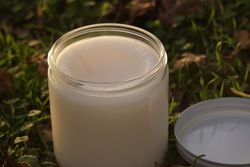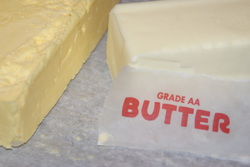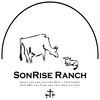 Free-range, Organic Fed (No Soy, No GMO's) Pork Lard - notice the pure white color.
Free-range, Organic Fed (No Soy, No GMO's) Pork Lard - notice the pure white color. What kind of oil do you cook with?
Almost every meal I cook here at #SonRiseRanch starts with some type of oil. Oil is an essential part of cuisine not only because it provides a medium for frying and sautéing, but because it is a source of energy and a vehicle for fat-soluble vitamins.
There are many options. Some traditional fats include:
- Butter (Raw cream butter is rich in beta carotene only if the Cow is grazing on green grass and not confined; see photo below)
- Ghee - just the fat portion of butter
- Lard - rendered swine fat
- Tallow - rendered bovine fat
- Shmaltz (drippings)
- Olive Oil
- Coconut Oil
 Store bought grade AA butter (thanks a lot USDA) pale white in color (on right). Raw, A2A2 Grass fed Jersey cream butter made by Eve Lindamood at SonRise Ranch in Garden Valley (on left).
Store bought grade AA butter (thanks a lot USDA) pale white in color (on right). Raw, A2A2 Grass fed Jersey cream butter made by Eve Lindamood at SonRise Ranch in Garden Valley (on left). - Canola Oil
- Soybean Oil
- Corn Oil
- Shortening (Crisco)
- Margarine
With so many options, and a plethora of contradicting scientific claims about the health of these oils, how can one choose which fat to cook with?
I take the following into consideration:
- How the oil is grown before it is extracted:
- Are pesticides used to grow the plant which oil is extracted from?
- Are oil crops grown using methods that deplete topsoil?
- Are the crops grown using genetically engineered seed?
- How the oil is extracted and refined:
- Is the oil extracted using toxic chemicals such as hexane?
- Are the monounsaturated and polyunsaturated oils oxidized during extraction or refinement?
- Have the oils been hydrogenated, or chemically altered, to change the consistency of the product?
Unfortunately, the answers are almost always “yes” for the newer oils listed above. What’s more, these vegetable oils have replaced nearly all of the traditional fats in restaurants, packaged foods, and have even snuck their way into products labeled as pure olive oil.
What this means is that I cook at home 99% of the time. I even like to make French fries in beef tallow made from #SonRiseRanchGrassFedBeef.
For the traditional fats, the answers are almost always “no” to the questions posed above, as long as the animals are raised on healthy pasture, and the plants are grown organically. Devotees of the lipid-heart disease hypothesis will warn you about the lipid profiles in traditionally used animal fats, but good science and personal experience can vouch for the health benefits of the fat-soluble vitamins, non-oxidized cholesterol, and pure energy contained therein.
We are currently offering rendered beef suet (called tallow) and rendered pork fat (called lard) so you don't have to save your bacon fat.

 RSS Feed
RSS Feed